-
What Happens to Recycled Plastic?
Does your home or business use recycling bins in Atlanta as part of a responsible waste management program ? If so, then you may be wondering what happens to the empty water bottles and milk gallons that you toss in the bin. Continue reading to learn what happens to recycled plastic.
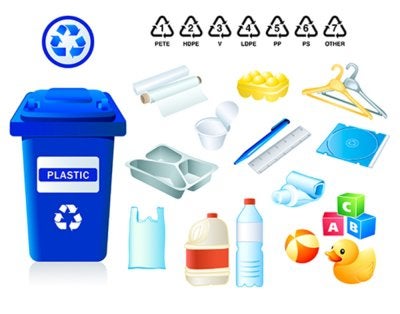
The plastic is collected.
To begin the recycling process, used plastic items are first collected through industrial, commercial, and residential recycling programs. The materials that are collected are then transported to a facility that specializes in sorting the plastic, paper, metal, and other items. Also, the plastic items might be sorted into those that come from plastic bottles, plastic bags, and other plastic varieties. Then, the sorted materials are baled and prepared for transport.
The plastic is processed.
The bales of plastic materials are sent to a manufacturing facility and then processed. During this stage, the plastic is chopped up into small pieces to make them easier to process. Next, to ensure a quality product at the end of the plastic recycling process, the little pieces of plastic are cleansed of any labels, dirt, or other debris before being dried. Finally, the clean plastic pieces are melted and then compressed into little pellets. At this stage, the processed plastic that has been transformed into little pellets is sold to various industries to be transformed into something new.
The plastic is reused.
Once the recycled plastic is in the hands of manufacturers, it can be used for a wide range of purposes. Your recycled milk jugs, laundry detergent containers, and shampoo bottles, for example, are usually made of a sturdy but lightweight plastic that, after being recycled, can be used to make items like new milk jugs, lawn décor, plastic lumber, and recycling bins. Your plastic grocery bags, food wrappers, and bubble wrap can be utilized to make everything from playground equipment and park benches to fencing and new plastic bags. Finally, your soft drink and water bottles can be recycled and made into items such as clothing, carpeting, sleeping bags, and new bottles.
-
What to Know About Recycling Ferrous Materials
Do you make it a habit to recycle near Atlanta ? If so, then you might benefit from learning about recycling ferrous materials.
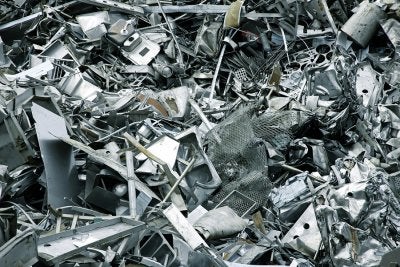
Ferrous and Non-Ferrous Metals
Scrap metal recycling involves collecting and sorting different metals, and then processing each type, and many people consider the scrap metal recycling industry to have 2 primary categories: ferrous and non-ferrous metal recycling. Ferrous metals are those that contain high amounts of iron, such as iron and steel. Some examples of non-ferrous metals include aluminum, stainless, steel, brass, bronze, and copper. Because of its molecular structure, iron has a much higher melting point than other metals. For this reason, not all metal recycling facilities are equipped to recycle iron, and many locations that do have different areas designated for ferrous and non-ferrous metals.
The Value of Ferrous Metals
Compared to metals like brass and copper, steel and iron aren’t particularly lucrative items to recycle. However, it’s worth bringing steel and iron with you to the scrapyard or putting it in the recycling bin, since doing so can lower your carbon footprint, reduce the amount of new ore that is mined, and keep the scrap metal out of a landfill. Steel is among the most commonly used metals worldwide, rusts easily, and attracts magnets. A magnet will also stick to iron.
The Ferrous Metal Recycling Process
The ferrous scrap metal recycling process begins with collection through residential, commercial, and industrial recycling programs. Next, the metal is brought to a recycling center where the different metals are sorted. To identify ferrous from non-ferrous metals, the scrap pieces pass beneath a magnet. Ferrous metals stick to this magnet, while non-ferrous metals remain on the conveyor. Then, the scrap metal is shredded and pressed into cubes to make it easier to process and transport. Once the ferrous metal cubes reach the smelting facility, they are melted into liquid molten metal and poured into molds to create ingots. Finally, the ingots are sold to industries to be used to fabricate new materials.
-
Why Your Carbon Footprint Matters
How often do you throw your trash into recycling bins ? Recycling things like aluminum cans, office paper, and glass bottles is a simple way to reduce your carbon footprint. If you’re wondering why many people are looking for ways to save energy and reduce waste near Atlanta, then read on to learn why your carbon footprint matters.
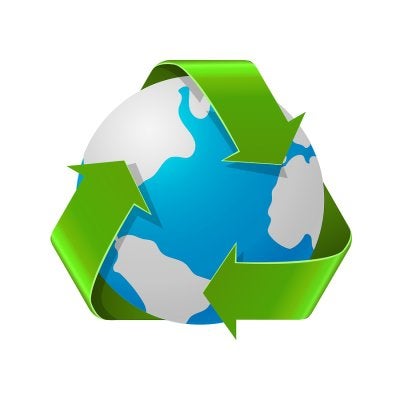
Environmental Changes
As the carbon footprints of people and industries increase, their effect on the environment does as well. Your carbon footprint corresponds with the overall amount of greenhouse gas emissions that you are responsible for due to your everyday activities, meaning that your carbon footprint relates to the climate change associated with global warming. For example, the rising temperatures affect precipitation rates and cause vegetation patterns and locations to change. Also, rising sea levels can displace people living in coastal towns and cities, and the erosion of shorelines can destroy shoreline ecosystems.
Wildlife Impact
The warming temperatures have influenced wildlife, as well. Changing weather patterns can threaten the species that depend on any vegetation unable to withstand the shifting climate. For example, migratory birds sometimes reach their destination only to find that their primary food source is unavailable due to unusual temperatures. At the same time, polar bears are losing their hunting grounds because of melting arctic ice.
Human Health
Food crops are heavily influenced by the weather, so it’s no surprise that rising temperatures are affecting the food supply in some areas. The changing climate has led to drought in some parts of the world, and the lack of precipitation results in smaller crops and increased levels of malnutrition. Also, drought can cause a lack of clean drinking water, and warmer climates allow disease-carrying mosquitoes to survive in areas that were once too cool for them.
Your Carbon Footprint
Reducing your carbon footprint can be accomplished in many ways. Recycling materials like glass, aluminum, and plastic can lower the amount of energy used to process raw materials. Also, you can unplug devices that aren’t in use, adjust your thermostat settings, and switch to energy-efficient light bulbs to reduce your carbon footprint.
-
The Many Benefits of Recycling
Just about every material that we use as a society can be recycled, and the advantages of doing so impact more than just the environment. If you’re wondering if it’s worth your time to send your recyclable waste to a recycling center near Atlanta , then watch this video to learn about the benefits of this form of waste management.
Recycling steel, aluminum, and many other metals can be done repeatedly without affecting the properties of the materials. This makes metal recycling particularly beneficial because it prevents the need to mine new ore and requires less energy than processing raw materials. Also, recycling paper saves trees and reduces the amount of water and energy needed to make paper. Finally, plastic recycling is incredibly versatile, allowing plastic bags to be made into something completely new, such as insulation or clothing.
-
A Look at Industrial Solid Waste
Are you looking for ways to reduce your business’s waste near Atlanta ? If so, then you might benefit from knowing more about different types of industrial waste. Read on for information about industrial solid waste and what you can do to reduce it.
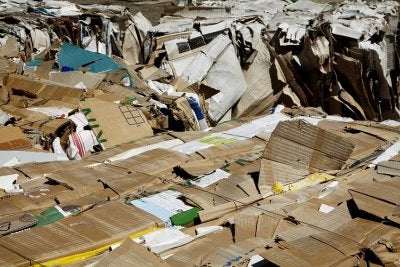
Defining Industrial Solid Waste
Industrial solid waste is that which is generated by businesses during manufacturing or industrial processes. Also, it can be produced as a separate waste source from a non-manufacturing activity. Any business, service, or commercial establishment that makes use of industrial or manufacturing processes probably produces industrial solid waste. By law, industrial solid waste is defined as a non-household and non-hazardous waste that requires evaluation to determine the proper waste disposal method.
Identifying Industrial Solid Waste
While the possibilities for industrial solid waste are nearly endless, there are some types that are commonly generated. Some of the most common examples of industrial solid waste include non-recyclable glass, oil-contaminated wastes, paint residue, tires, and electrical components. Additional examples would be food waste, animal remains and carcasses, empty chemical containers, infectious wastes, and confidential documents.
Evaluating Industrial Solid Waste
When it comes to waste management, the generator of the industrial solid waste is held responsible for evaluating the waste and proving that it is non-hazardous through methods like laboratory testing or documenting the waste’s characteristics. Warehouses, food processing facilities, automotive manufacturers, and distribution centers are some examples of sites that might produce industrial solid waste.
Reducing Industrial Solid Waste
As many business owners are glad to learn, there are several ways in which companies can decrease the amount of industrial solid waste that they reduce. First, upgrade to technology and production techniques that lessen the amount of waste created. Next, maintain your equipment and ensure that your team is properly trained. Finally, initiate an industrial waste recycling program. By reducing the amount of industrial solid waste produced by your business, you can save on waste management costs and reduce your company’s environmental impact.
-
Recycling E-Waste
With the number of technological devices in use today, e-waste recycling serving Atlanta plays an important role when it comes to managing waste disposal . You’ve probably recycled a television, computer, or cell phone in the past, but have you ever wondered about the electronic recycling process? If so, then watch this video to see what happens when you recycle e-waste.
Most devices that have a cord or a circuit board can be processed at an e-waste recycling center. Using centrifugal forces, each electronic device that makes it to the plant is disassembled. Then, glass, plastic, copper, aluminum, and steel pieces are sorted and processed to be made into new materials.
-
Why Industrial Recycling Is Important
More and more, people are learning about what can and can’t go in their household recycling bins in Atlanta as they embrace their role in reducing the impact that they have on the environment. While residential recycling is important, it’s essential not to underestimate the important of industrial recycling .
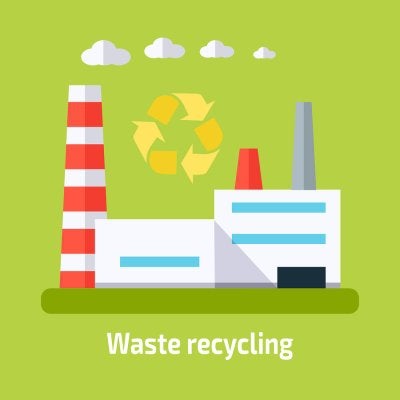
Recycling Preserves Resources
There are several reasons why people should feel motivated to recycle. First, when waste is sent to landfills, it can release harmful greenhouses gasses and chemicals into the air. Also, processing raw materials to create goods requires a huge amount of energy and is often environmentally destructive, while recycling demands less energy and reuses materials. Recycling can help preserve natural habitats and our current way of life, and it can also save businesses on operational costs and taxes.
Industries Create Waste
Industries and businesses create incredible amounts of waste every day. Food processing facilities, for example, end up tossing large amounts of food and throwing away food containers and shipping boxes. A distribution center might go through large amounts of paper every day, and automotive facilities and appliance manufacturers may generate massive amounts of scrap metal. In addition to creating the waste, disposing of it can be costly and wasteful, as it must be hauled to landfills where it takes up space. Because industries create so much waste every day, the importance of recycling in this area is critical.
Recycling Reduces Waste
If you’re interested in lowering your company’s carbon footprint and reducing your waste disposal costs, then there are several steps that you can take. First, learn what waste collection services are available for businesses in your area. Then, implement a recycling system that focuses on your company’s needs. If having a few small bins make sense for your office, then installing just one each for paper, plastic, and glass and educating your team about what should go in them is a great way to foster a greener company.
-
What to Do About Restaurant Waste
If you are a restaurant owner, then you are aware of the incredible amount of food waste that can be produced in this type of commercial environment. If you feel frustrated with the amount of waste and the high costs of waste disposal that you deal with at your establishment, then you can benefit from learning about what you can do about your restaurant waste near Atlanta.
The first step in developing a better waste management system is to reduce the amount of waste produced. To do this, begin taking a regular inventory of items that are frequently thrown out so that you can develop a better system for using the ingredients efficiently and purchasing only as much as you will use. Next, consider your options for disposing of the food waste other than tossing it in the dumpster. There is a wide range of items accepted by food banks that may include some of what you regularly toss out. Also, you can donate your food scraps to local farms or animal sanctuaries, where they can be used to feed animals. Finally, learn if there is a composting system in place in your area that accepts restaurant waste for recycling.

-
Spotlight on Non-Ferrous Metal Recycling
All recyclable materials have their worth, but non-ferrous metals are particularly valuable. If your company produces scrap metal or if you are interested in the effects of recycling on the environment, then you can benefit from learning more about non-ferrous metal recycling near Atlanta.
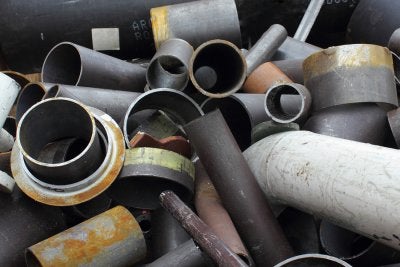
What are non-ferrous metals?
Non-ferrous metals include copper, zinc, tin, nickel, aluminum, lead, gold, silver, platinum, and others. The metals in this category do not contain iron, are non-magnetic, and are more resistant to corrosion than ferrous metals. Of all the recyclable materials, non-ferrous metals are among the few that do not break down or lose their physical or chemical properties during the recycling process, meaning that they can be reused an infinite number of times without changing in composition. These characteristics make non-ferrous metals incredibly valuable recycling materials.
What items are made from non-ferrous metals?
A large amount of the non-ferrous metal that is recycled in the United States comes from industrial waste resulting from the production of goods like cars and appliances. Some examples of industrial sources of non-ferrous scrap metal include automobile batteries, radiators, boats, window frames, airplane parts, aluminum siding, pipes, and electrical wires. As a consumer, you might find yourself recycling these metals in the form of soft drink cans, packaging materials, cookware, cutlery, batteries, tin cans, and door knobs.
How are non-ferrous metals recycled?
If referring to volume, then non-ferrous metal recycling doesn’t account for much of all recycled materials in the United States. However, in terms of scrap metal, non-ferrous metal scrap made up more than 50% of total scrap recycling industry earnings in the country in 2012. The process starts with non-ferrous metal being collected through industrial, commercial, and residential recycling systems. The metal is then transported to a metal recycling center, where it is sorted. Each variety is then processed, refined, and converted into billets and ingots which are later sold to industries to be transformed into goods and start the process once again.
-
The Benefits of Recycling Glass
When you visit a location that has recycling bins , you’ll often see one that is designated for glass, because recycling this material offers several advantages. If you’re wondering if you could benefit from glass recycling serving Atlanta, then continue reading.
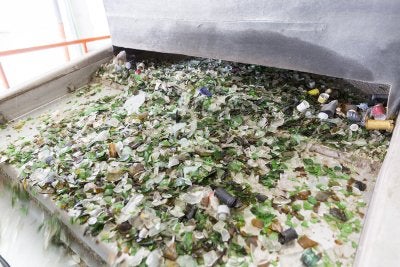
Recycling glass can be done repeatedly.
To understand the benefits of glass recycling, it can be helpful to know how it is created. Glass is made from materials that are readily available in our environment including soda ash, limestone, and sand. Silica, in the form of sand, is the primary ingredient and, when combined with soda ash and limestone and heated to incredibly high temperatures, these minerals melt and form glass. In addition to these ingredients, other materials can be included to give the glass different properties or colors. Because of the way in which glass is made, it can be processed again and again with no loss in purity or quality, meaning that it is a valuable and practical recycling material.
Recycling glass benefits the environment.
When new glass is produced, a significant amount of what goes into it is often glass that has already been made and recycled. This recycled glass that is considered to be “furnace ready” is referred to a “cullet” in the industry. Cullet can be substituted for as much as 95% of raw materials, making it a smart item to recycle. Also, glass provides a better material for food packaging because it is 100% recyclable, a claim that few other food packaging materials can claim. Recycling glass can help the environment by providing industries with more glass to use for packaging and at potentially lower costs.
Recycling glass can reduce energy usage.
The more cullet that is used in the recipe for new glass, the less heat and energy is needed for the glass-making process. By recycling glass, you can help return more of this material to the recycling system where it can be processed and converted into cullet. For this reason, recycling glass can reduce your carbon footprint.
RECENT POSTS
categories
- Uncategorized
- Waste Management Atlanta
- Waste Disposal and Recycling
- Hazardous Waste Disposal
- Chemical waste removal
- solid waste removal
- R3 Program
- Sustainable Organizations
- Sustainable Waste Removal
- Commercial Waste Removal
- Materials Management Program
- Dumpster Rental
- Roll Off Dumpsters
- Construction Site Waste Removal
- Sustainability
- Recycling in Atlanta
- Industrial Recycling
- Industrial Waste Removal Services
- Southern Waste & Recycling
- Waste Removal Atlanta
- Waste Specialists
- Atlanta
- Infographic
- Front Load Dumpsters
- Rear Load Dumpsters
- Reusable Electronics
- Dump Truck Atlanta
- Recyclable Electronics
- Trash Compactors
- Recycling
- Recycling Program
- Office Recycling
- Metal Recycle
- Electronic Waste
